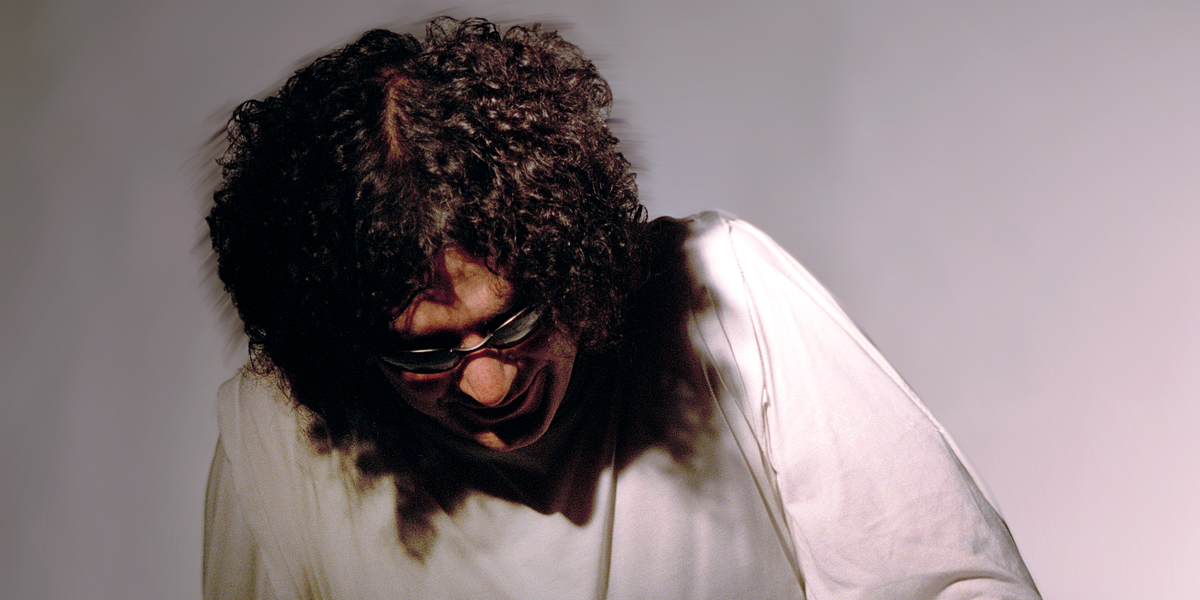
Palmistry cannot tell the future. If he could, we wouldn't have ended up here. “I mean it’s a very bleak period of history,” says the pseudo-prescient musician and producer, Benjamin Keating. To say he’s disillusioned or cynical would be lazy. His is a bruised optimism. After two years of a global pandemic, isolation, collapsing social structures, and a creative industry that’s becoming evermore quantifiable, who hasn't struggled to find the silver lining?
For Keating, Palmistry is not about prophecy but divining meaning. Over the course of an unpredictable career, he’s constructed a web of symbols, sounds and personas. The most recent manifestation comes in the form of TINKERBELL, his 16-minute sonic retelling of a drug dealer named Tinkerbell suffused with Keating’s own experiences from his time in L.A. When I ask if TINKERBELL feels like a culminating record — the "career album" his past work has been building towards — he replies bashfully.
“I feel like, honestly, I normally hate all the music that I’ve made. But this the first record I’ve been really proud of,” Keating explains, adding that he means this apart from Triad God, the elusive project he produced for Vin Soi Ngan that was last seen in 2019.
Keating has remained fairly anonymous about his role in Triad God, even “pleading the fifth” when I requested a lyric transcription of “Triad God's Coda.” But he tells me that the song comes from an unfinished interview project the two embarked on, which speaks to Keating’s affinity for language and his aims to move towards spoken word songwriting.
“The inspiration for [TINKERBELL] is trying to tap into the Triad God style and have it be more spoken word,” Keating says. “It was a really beautiful process making this record. It all came together — without sounding like a crackpot — but quite like pseudo. Well, not pseudo-spiritual, but not quite spiritual.”
His relationship with religion is as tenuous as with his music. The son of a church pastor and a musician, his practice resides somewhere in between. First following in his mom’s footsteps to pursue music, he feels uncertain about the logic of religion.
“I was just trying to deal with my own emotional disturbances and music seemed to help.” Keating adds, “I’d say I’m a spiritual person. That sounds really pretentious... I’m a bit more drawn to non-logical types of thinking. I don’t really have a relationship to religion, I don’t really go to church. I don’t believe in it. I’m not an atheist, but probably agnostic.”
TINKERBELL is rife with multireligious references, blending The Veda and The Psalms in its opening. But there is duplicity throughout the album–from the personal ephemera from Keating’s half-English half-Irish upbringing on “Rose Dub” to “Rainer” an interpolation of the famed UKG song “I’m Sorry” by Monsta Boy and nod to one of Keating’s favorite poets, Rainer Maria Rilke. Among his literary idols, Keating notes an affinity for Sturm und Drang and Goethe, and Dambudzo Marechera, the Zimbabwean poet who allegedly set fire to the Oxford English Department as influential. His penchant for rabble-rousers echoes in his idolization of inglorious director Tony Kaye, who he sends me a TikTok of following our call.
“What’s really beautiful about poems is they can resonate to be their own songs. But being a musician, I find that you can make a good melody and then you get away with writing bad stuff. With poetry or writing in general, you’re exposed if it doesn’t resonate.”
On the state of music now, there is little that resonates with Keating. “I really struggle with music, honestly,” he shares, disheartened by the commodification of the art form by platforms that determine success via stream counts. “This is not what I signed up for. I didn’t get into music to be caring about that.”
I mean to ask what gives him hope, but he beats me to it. I say that even with all the algorithms and streaming bullshit, people still have to interact. People are still listening. Each listen can foster a deeper connection between people. When words, however resonant, can’t convey a feeling, I can share a song to capture in seconds what would take hours to explain.
“It’s true,” Keating concedes, the ever-reticent optimist. “I think it’s easy to focus on the negative, but there’s a lot of interesting parts too. I don’t listen to much, but I listen to my friends’ music.” Among friends, Keating is lucky to mention Dean Blunt, Caterina Barbeiri, and TINKERBELL collaborators Yung Lean, Bladee (a fellow Benjamin), Isabella Lovestory, Peake and Nation.
Related | Yung Lean Is Fulfilling His Prophecy
We end our two hours together trading Christian mysticism and Backstreet Boys for psychogeography and Gil Scott-Heron. He asks if it’s cheesy to read Goethe and Rainer Maria Rilke in Austria, where I was raised. I tell him about my German teacher who crept around the classroom with a stuffed toy panther.
Mentally, I trace the line from Rilke’s famous poem, “The Panther,” to Palmistry. A bright spirit trapped in a dull circle — it seems to him there are a thousand bars; and behind the bars, no world — the strength of sincerity in the shell of facade — the movement of his powerful soft strides is like a ritual dance around a center in which a mighty will stands paralyzed.
In TINKERBELL, Keating claims the chaos bubbling under his ebullient sound. Facing the mayhem head-on, he intensifies a moment in time, however bleak. A subtle expression of freedom, TINKERBELL offers escape in a 16-minute blink of an eye.
...An image enters in,
rushes down through the tensed, arrested muscles,
plunges into the heart and is gone.
Photo courtesy of Elliot Denman